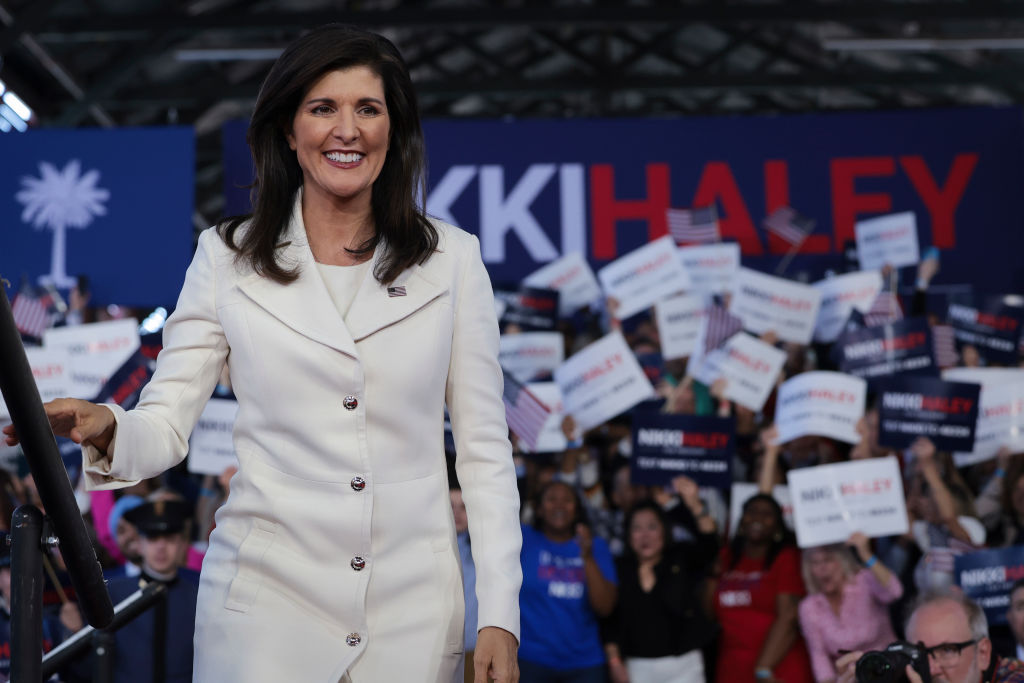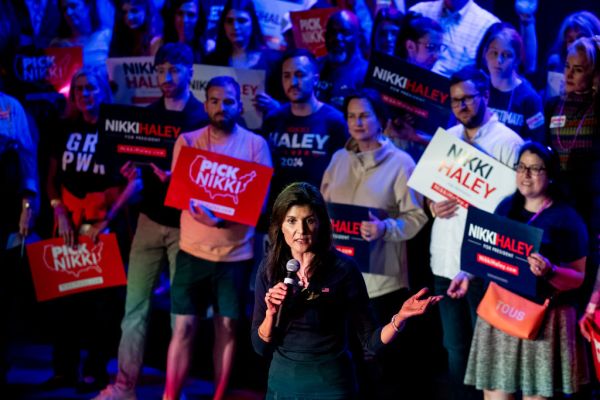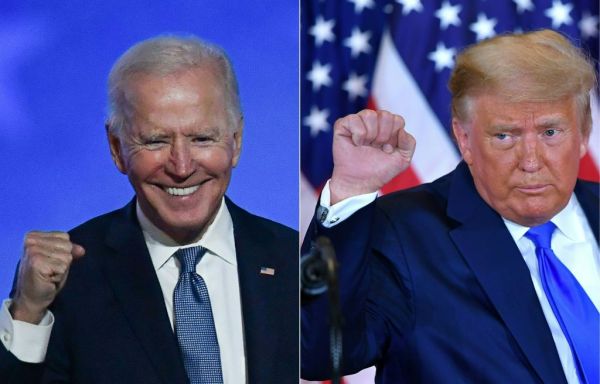In America you can win office by running mostly on “vibes.”
We don’t like to admit that because it’s not how democracy is supposed to work. The people, in their wisdom and upon painstaking deliberation, opt for the candidate who offers the most appealing policy platform—in theory.
In practice, sometimes the right “vibe” is enough. You’ve seen the data on the height of U.S. presidents, I assume. You’re perhaps aware that, more than a century after women won the right to vote, the country has yet to elect a woman president and has chosen to nominate a woman to lead a major-party ticket exactly once.
Three months ago, a far-left liberal with a brain injury somehow defeated a centrist Republican in a swing state during an election cycle that was supposed to favor the GOP. How’d he do it? Vibes, mainly.
I’d argue that Joe Biden owes his victory over Donald Trump in 2020 to vibes more so than to policy differences. Swing voters might not have strongly favored his plans for COVID or immigration or spending but they sure dug the “return to normalcy” vibe he was putting out.
Ronald Reagan’s landslide in 1980 was as much about a “vibe shift” after the disillusionment of the 1970s as it was about a conservative revolution in the public’s policy preferences, I think. Likewise for Barack Obama’s landslide in 2008. After two terms of a conservative administration in which every year seemed worse than the last, the public was spoiling for change. And nothing said “change” like electing the solidly liberal first black president.
Day one of Nikki Haley’s new campaign for president suggests she’ll also be running on “vibes.”
Entirely on “vibes,” maybe.
A vibe-heavy campaign can work, as Reagan, Obama, and Biden demonstrated, but they had two things going for them that Haley doesn’t. In the general elections they won, they were the lone alternatives to a failed, unpopular governing establishment. That won’t be the case for her in the coming primary. And the “vibes” they were generating were broadly in sync with the mood of the electorate they were trying to persuade.
That won’t be the case for Haley either. To put it mildly.
Let’s look at the first 24 hours of her campaign. The good, the bad, and the ugly.
The good: She’s already making some of the right enemies.
This clip circulated widely on conservative Twitter on Thursday morning. It’s not great.
Haley is 51, younger than Kamala Harris and considerably younger than Hillary Clinton was when she ran for president in 2016.
Her campaign is already taking advantage of Lemon’s idiocy, knowing that the fastest route to building goodwill with the Republican base is being attacked by people they hate. “They’ll tell you who they fear,” conservative activists like to say when the liberal media turns its fire on one of their populist heroes. (Never mind that the same media helped their greatest hero to the Republican nomination in 2016 with $2 billion in free coverage.) A sexist swipe from a smug CNN anchor is an in-kind donation to Haley’s campaign inasmuch as it reminds skeptical righties that, despite their differences, she’s one of them after all.
The ugly leftist habit of implying that Haley is some sort of race traitor has also recurred on social media since her announcement.
Search Twitter for the word “Nimrata,” Haley’s given first name, and you’ll find endless sneering tweets referencing it. “First of all, f— you Nimrata Haley,” presidential niece turned D-list progressive celebrity Mary Trump tweeted. “Second, you are a racist, anti-American sell-out.” The belief that Haley changed her name to “whiten” her political image and boost her appeal to voters is eternal and seemingly unfalsifiable among liberals, but it is false. “Nikki” is her given middle name, one she’s been called by since childhood. And it’s not anglicized; it’s a term of affection meaning “little one” in Punjabi, apparently.
“Nimrata” is the progressive version of conservatives calling Trump’s predecessor “Barack Hussein Obama.” Watching the likes of Jemele Hill and Mary Trump impugn Haley’s racial authenticity will cause conservatives who are otherwise ambivalent about her to rally to her defense.
At least until Trump starts calling her “Nimrata” too.
Finally, Haley’s launch drew fire from some of the right’s most obnoxious populists, a mixed blessing for a candidate in her “lane.”
Yesterday Ann Coulter complained during an interview about Haley’s decision to remove the Confederate battle flag from the South Carolina statehouse when she was governor. “Her candidacy did remind me that I need to immigrate to India so I can demand they start taking down parts of their history,” she groused. “What’s with the worshiping of the cows? … Do you know they have a rat temple where they worship? Rats? Hey babycakes, why don’t you go back to your own country and reconsider that history?”
No Republican wants to be despised by the “go back where you came from” wing of the party in the Trump era, as it’s an awfully big wing. But Haley was always DOA among those voters; the ones she’s competing for are those who want a new direction. The scorn of people like Greene and Coulter might help her distinguish herself among that constituency.
The bad: She won’t identify her policy differences with Trump.
One of the best things about Haley running for president, I argued earlier this month, is that she’s likely to make the case for supporting Ukraine. I wouldn’t bet my life on it: The share of Republican voters who believe the U.S. should continue supplying weapons to Zelensky’s country is down to 39 percent, which must be weighing on her and her advisers. But in a career lately distinguished by political opportunism, defense hawkery has remained a constant in Haley’s politics. Even as ambassador to the United Nations under Trump, she sounded more like Ronald Reagan when commenting on Russia than she did her boss.
Yesterday began auspiciously. “We will stand with our allies from Israel to Ukraine and stand up to our enemies in Iran and Russia,” she declared in her announcement speech in Charleston. If all Nikki Haley accomplishes by running for president is shaming the rest of the field for simping for Putin, it’ll have been worth it.
After her speech, she did the rounds of national media and ultimately landed on Sean Hannity’s show. Quite reasonably, he asked her to explain where she and Trump differ on policy. Quite unreasonably, Haley didn’t say “Ukraine.” She didn’t say anything, in fact. She dodged the question.
Uncharacteristically, Hannity refused to let her slide. No, really, he said, where do you and Trump differ on policy? Haley’s response:
What I am saying is I don’t kick sideways, I’m kicking forward. Joe Biden is the president, he’s the one I’m running against. What I’m saying is you don’t have to be 80 years old to be president. We don’t need to have these same people going back again.
We need something new, we need a new generation of fighters. We need people that understand where your average American is coming from. And we shouldn’t be afraid to fight for that, and that’s what I am willing to do.
I’m not going to kick sideways, I don’t have time for that, that’s not my focus, I’m kicking forward and it is all about Joe Biden and the people in America winning again.
What?
Trump had no trouble yesterday specifying his differences with her. “Instead of Finding a Peaceful Solution to the Ukraine-Russia War, Haley Has Supported Sending More American Fighter Planes to Fuel the War,” read one header on the statement his campaign issued after her speech. (For those who don’t know, “Peaceful Solution” is populist code for Ukraine capitulating to Russia.) Another header noted Haley’s support in 2010 for entitlement reform, a reminder that Trump is planning to run decidedly to the left on fiscal issues and foreign policy in the coming primary.
If Haley’s not going to confront populists on points where she disagrees with them, and if she’s not going to adopt their positions as her own in order to cover her populist flank, what’s the plan for navigating MAGA attacks on her Reaganite beliefs?
Is she hoping her opponents simply … forget to make them?
Strategic silence has its place in this primary. Ron DeSantis has been shrewd so far to ignore Trump’s insults in order to avoid offending the MAGA voters he’s trying to woo. Instead he’s preached party unity in the name of defeating the common enemy. But unity has its limits, even for him: DeSantis will hit Trump eventually on their differences, starting with how each responded to COVID.
Watching Haley clam up when Hannity offered her a chance to sell his viewers on her platform functioned as a tacit admission that, unlike DeSantis, she can’t make a policy case that might win a majority of Republicans. Which is an awfully grim admission for day one of a presidential campaign.
Because she can’t out-populist Trump or DeSantis on policy, Haley’s strategy to ingratiate herself to populists might be described as “MAGA by association.” In so doing she’s following the playbook of Glenn Youngkin, another traditional conservative in search of populist authenticity who embraced figures like Amanda Chase and Kari Lake to show Trump fans that he and they aren’t so different after all.
For Haley, MAGA by association involves rolling out first-week endorsements from characters whom you might expect to find warming up the crowd at an especially rowdy Trump rally. Remember Rep. Ralph Norman, the nut who implored Trump to invoke “Marshall Law” on January 17, 2021, in order to prevent Biden’s inauguration? He’s Team Haley this time. How about Don Bolduc, the (former) election truther endorsed by Trump for Senate in New Hampshire and lovingly referred to by Steve Bannon simply as “the general”? Also Team Haley.
The man who opened yesterday’s Haley announcement was John Hagee, a Christian pastor so controversial that John McCain renounced his endorsement for president in 2008 over remarks Hagee had made about Hitler and Jews. Fifteen years later, as if to illustrate the GOP’s civic deterioration, the most mainstream candidate in the field is touting Hagee’s support. “To Pastor Hagee, I still say I want to be you when I grow up,” Haley cooed when she took the mic yesterday.
She’ll have no trouble getting a hearing from normie voters, as she looks and sounds every inch the classic normie Republican. But as for populists who doubt her authenticity, she can point to Norman, Bolduc, and Hagee and say (implicitly): If I’m kooky enough to be endorsed by some of your favorite kooks, I must be kooky enough for you.
If you think that’s enough to win a primary against Trump and DeSantis without articulating any differences with them on policy, that makes one of us.
The ugly: She’s already retreating from attacks she’s made on Trump.
Despite dodging opportunities to engage on policy yesterday, Haley distinguished herself repeatedly on biographical grounds. She’s a woman, in case you hadn’t noticed. And she’s also much younger than certain septuagenarian frontrunners who shall remain nameless.
New blood, new leadership, new generation: That was the mantra of day one. “We’ll have term limits for Congress and mandatory mental competency tests for politicians over 75 years old,” she said in her speech, adding, “America is not past our prime. It’s just that our politicians are past theirs.”
Coincidentally, Donald Trump turned 76 last June.
Recently I predicted that her attacks on our senescent leadership class might be one of her most fruitful contributions to the primary, placing Trump’s age front and center before a Republican electorate conditioned by Biden to believe that the presidency is no job for old men. Convincing populists that they need to go younger next year probably won’t lead to them nominating Nikki Haley, but it could lead them rallying behind someone other than Trump.
So here she was on Thursday morning, teed up by Fox News to press her case that Trump has lost a step, and … she whiffed, seemingly having already lost her nerve. Worse than that, in fact: She actually went to bat for him on his cognitive wherewithal.
You can’t watch that clip without concluding that she’s running for vice president after all.
Her lack of nerve is also showing when touting her biggest physical difference with the rest of the field. Head over to the Haley 2024 campaign store and you’ll find T-shirts and stickers with the slogan “Sometimes It Takes a Woman.” Over and over lately, she’s referred (somewhat strangely) to “kicking” her opponents while noting that it hurts them more when you’re wearing heels. “May the best woman win,” she declared archly in her announcement speech …
… before remembering which party she belongs to. “All kidding aside, this is not about identity politics,” she assured the crowd. “I don’t believe in that.” Some viewers rolled their eyes at Haley brazenly trying to have it both ways.
What she means to imply by emphasizing her gender, I think, is that the Republican Party has taken a brutish, esoteric turn under Trump and nominating her would recivilize and renormalize it. That’s not a message that’ll win over populists apt to view female leadership as “soft” unless it’s defined by combativeness, like Marjorie Taylor Greene or Lauren Boebert. But, again, Haley has no chance with that group; her play is to build momentum with old-school Republicans who want a sharp break with Trumpism and hope that her alleged “electability” among swing voters will help bring reluctant MAGA voters along in the name of defeating Biden.
But all of that has to be implied, not asserted. The moment she were to say, “We’d fare better with a woman nominee,” she’d be vaporized for having—gasp—stooped to identity politics. Which, lord knows, Republicans in good standing certainly don’t practice.
The bottom line: Nikki Haley believes her opponents this year are too old and too male to set the party and the country right. Except for her main opponent, Donald Trump, that is. He’s fine.
One wonders how quickly she’ll backpedal when she’s eventually pressed on what she meant, exactly, when she said Republicans have lost the popular vote in seven of the eight elections. She doesn’t believe Joe Biden won, does she?
Consider all of the above, what’s left from the first day of Haley 2024 except … vibes?
“Haley’s launch event was a dip back into a political time before Donald Trump, even as she called for a new generation to succeed him,” Politico said of the atmosphere at her rally. “Had a Republican activist emerged from under a rock for the past 10 years, the scene before them would have felt very familiar.” The event was polished, the candidate was poised and optimistic, the bromides ran thick. If you’re a conservative looking for a refuge from populism, Haley’s event was your happy place.
The vibe she channeled was one of nostalgia, an irony given that Trump himself rode nostalgia to the presidency in 2016. His nostalgia is for the America of the 1950s; Haley’s nostalgia is for the Republican Party of 2010. (Another irony: Neither of those was as great as its admirers like to pretend.) But a vibe is all it was. When Haley was asked two years ago whether she preferred the GOP of yesteryear, she insisted that she didn’t. “We need him in the Republican Party,” she said of the former guy to the Wall Street Journal at the time. I don’t want us to go back to the days before Trump.”
Nostalgia without nostalgia, identity politics without identity politics, MAGA without MAGA: Because Haley lacks the nerve to challenge Trump on policy or to forthrightly contrast the differences in their backgrounds, the lone woman candidate in the 2024 race stranded herself in a sort of political no man’s land on day one. All she had to offer at the end of the day was vibes. It won’t be enough.









Please note that we at The Dispatch hold ourselves, our work, and our commenters to a higher standard than other places on the internet. We welcome comments that foster genuine debate or discussion—including comments critical of us or our work—but responses that include ad hominem attacks on fellow Dispatch members or are intended to stoke fear and anger may be moderated.
You are currently using a limited time guest pass and do not have access to commenting. Consider subscribing to join the conversation.
With your membership, you only have the ability to comment on The Morning Dispatch articles. Consider upgrading to join the conversation everywhere.